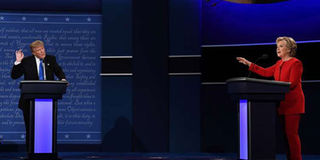A look at America’s most ‘African’ election in many years

Republican presidential candidate Donald Trump (left) speaks as his Democratic counterpart Hillary Clinton gestures during the presidential debate at Hofstra University in Hempstead, New York on September 26, 2016. PHOTO | JEWEL SAMAD | AFP
What you need to know:
This election exposing the soft underbelly of American democracy – and not only in the lacklustre quality of the candidates.
Of course there are important distinctions to make: President Barack Obama did not amend the US Constitution to allow him seek another term in office as has happened in Rwanda, Burundi, Uganda and elsewhere; neither did he push back the election itself citing a need to hold a census first, as Joseph Kabila has done in DR Congo.
At a campaign rally in May 2016, supporters of a presidential candidate pepper-sprayed a rival group that was holding a protest rally nearby. The previous month, skirmishes had been reported between supporters and opponents of the presidential candidate.
Incumbents in African elections often abuse State power and use violence to undermine the challenges posed by rivals but the scenes above are a backdrop to the contest between Hillary Clinton and Donald Trump, which comes to an end this morning.
This has arguably been America’s most ‘African’ election in many years, exposing the soft underbelly of American democracy – and not only in the lacklustre quality of the candidates. Of course there are important distinctions to make: President Barack Obama did not amend the US Constitution to allow him seek another term in office as has happened in Rwanda, Burundi, Uganda and elsewhere; neither did he push back the election itself citing a need to hold a census first, as Joseph Kabila has done in DR Congo. Yet some of the electoral shenanigans in the American election could have been cast in a third-rate African political documentary.
Take for example Trump’s repeated claims of a “rigged” election. While it is hard to countenance images of pre-ticked votes being stuffed in ballot boxes, an opinion poll by Politico Magazine among 1,999 registered voters in mid October showed that 41 per cent of voters believed the election could be stolen from Trump due to widespread voter fraud.
DECIDEDLY PARTISAN
The sentiments were decidedly partisan – seven out of every 10 Republican respondents held such fears compared to just 17 per cent of Democrats – but it is a sentiment widely held by opposition candidates and their supporters in African elections where the power of incumbency is often overwhelming. It also makes sense in a campaign where Trump positioned himself as an outsider running against an establishment candidate.
This campaign also stands out for the sheer amount of external influence and meddling observed, including the hacking and release of emails from the Democratic Party camp by operatives allegedly linked to Russia, whose leader, Vladimir Putin, Trump has openly spoken of with admiration.
African watchers, long used to hint-hint, nod-nod suggestions from powerful foreign donors during campaigns, or open endorsements of incumbents by other African leaders eyeing quid-pro-quo political alliances would have found this unnervingly similar.
Elections in many African countries, including Malawi, Ivory Coast, Zambia and elsewhere rarely pass without disputes over the citizenship of leading candidates – an inevitable and rather petty argument in a continent whose internal borders were arbitrarily drawn by colonial powers in Berlin in 1884.
America, whose laws restrict the presidency to people born on American soil, has not been spared this “birther” argument, albeit more loudly in the last two elections where Obama, the first non-white President was on the ballot.
RUN DEEPER
However, while most of these contradictions in American politics might have come to the fore in the Trump-Clinton contest, they run much deeper and much further into the country’s history. For instance, violence in American politics can be traced as far back as the 1804 killing of former Treasury Secretary Alexander Hamilton in a duel, into the next five decades when violence routinely broke out between ‘native’ whites and recent immigrants.
One Monday in 1855, 22 people, most of them German and Irish immigrants, were killed and many others injured in an election day riots in Louisville, Kentucky. Trump, a descendant of immigrants, is only the latest incarnation of the xenophobia – and later racism and patriarchy – that have been a living part of American politics.
Even the American civil war, a defining moment in the country’s history, was sparked off by the refusal of southern States to accept the results of the 1860 presidential election and the fear that the winner, Abraham Lincoln, would immediately set upon eradicating the slave system.
This American election has often felt like a race to the bottom and an attempt to select the least-worst candidate but it is also a reminder of the racial, social and political tensions in the American fabric. While this particular campaign has been fought with the backdrop of the #BlackLivesMatter movement, threats to ban Muslim migration and to build a wall across the border with Mexico, American history is littered with long and bloody attempts by white supremacists to keep blacks and Latinos off the ballot – attempts that were stopped in their tracks by the Voting Rights Act of 1965, but which still live on in more nuanced ways.




